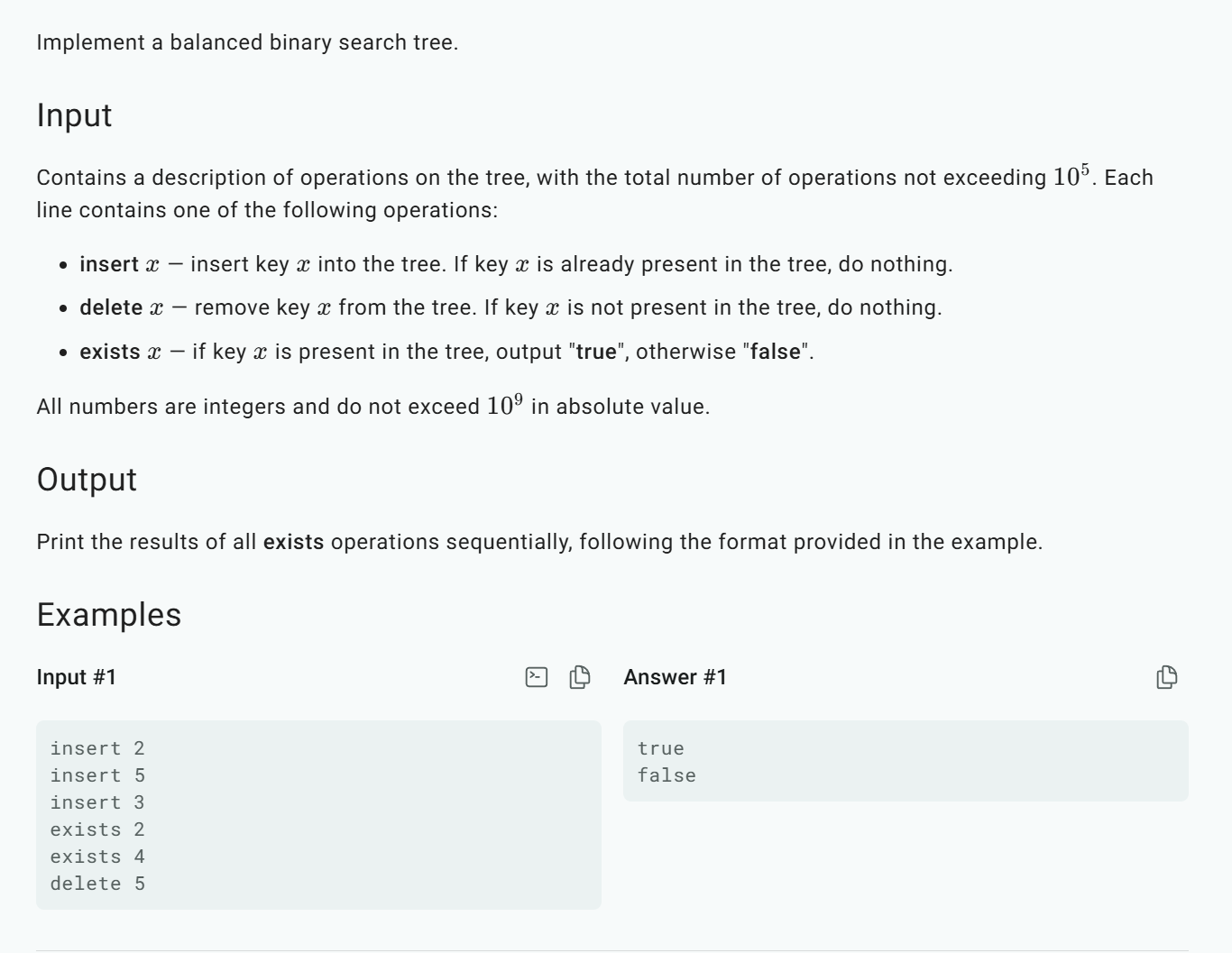Binary Search Tree 1(EOlymp - 4146、AVL模板题)
题面
题目链接:传送门

题意
实现一棵bst的插入、删除、查找功能
思路
可以用set之类的模拟,但最近在学avl,所以就来调试avl模板
代码
#include <cmath>
#include <queue>
#include <cstdio>
#include <string>
#include <iostream>
using namespace std;
typedef long long LL;
typedef pair<LL, LL> pLL;
typedef pair<LL, int> pLi;
typedef pair<int, LL> pil;;
typedef pair<int, int> pii;
typedef unsigned long long uLL;
#define fi first
#define se second
#define lson (rt<<1)
#define rson (rt<<1|1)
#define lowbit(x) (x&(-x))
#define name2str(name) (#name)
#define bug printf("*********\n")
#define debug(x) cout<<#x"=["<<x<<"]"<<endl
#define FIN freopen("./in.txt","r",stdin)
const double eps = 1e-8;
const int mod = 1000000007;
const int maxn = 1000000 + 7;
const double pi = acos(-1);
const int inf = 0x3f3f3f3f;
const LL INF = 0x3f3f3f3f3f3f3f3fLL;
int x;
char op[10];
#define stature(x) (x ? (x)->_h : -1 ) // 节点高度,空节点高度为-1
#define BalFal(x) (stature(x->lc) - stature(x->rc)) // 平衡因子
#define AVLBalance(x) (BalFal(x) >= -1 && BalFal(x) <= 1) // avl平衡条件
// 儿子中较高者,如果左右子树树高相等则优先考虑和父节点同方向的儿子
#define tallerChild(x) (\
stature(x->lc) < stature(x->rc) ? x->rc : (\
stature(x->lc) > stature(x->rc) ? x->lc : (\
(x->fa && x->fa->lc == x) ? x->lc : x->rc\
)\
)\
)
// 获取来自父亲的引用,以保证与其他部分连通
#define FromParentTo(x, _root) ( (x->fa) ? (x->fa->lc == x ? x->fa->lc : x->fa->rc) : _root)
template <typename T>
struct AVLNode {
T val;
int _h;
AVLNode *fa, *lc, *rc;
AVLNode(T v, int h = 0, AVLNode *f = nullptr, AVLNode *l = nullptr, AVLNode *r = nullptr) : val(v), _h(h), fa(f), lc(l), rc(r) {}
void updateHeight() {
_h = 1 + max(stature(lc), stature(rc));
}
bool operator == (const AVLNode* x) const {
return val == x.val;
}
void updateHeightAbove() {
updateHeight();
if (fa) fa->updateHeightAbove();
}
AVLNode* Succ() {
AVLNode *ret = this;
if (ret->rc) {
ret = ret->rc;
while (ret->lc) {
ret = ret->lc;
}
} else {
while (ret->fa && ret == ret->fa->rc) {
ret = ret->fa;
}
ret = ret->fa;
}
return ret;
}
};
template <typename T>
class AVL {
AVLNode<T> *_root;
AVLNode<T> *_hot;
public:
AVL(AVLNode<T> *r = nullptr) : _root(r) { _hot = nullptr; }
~AVL() {
destory(_root);
}
void destory(AVLNode<T> *cur) {
if (!cur) return;
destory(cur->lc);
destory(cur->rc);
delete cur;
}
AVLNode<T>*& search(const T& e) {
if (!_root || _root->val == e) {
_hot = nullptr;
return _root;
}
_hot = _root;
while (true) {
AVLNode<T> *&ret = e < _hot->val ? _hot->lc : _hot->rc;
if (!ret || ret->val == e) return ret;
_hot = ret;
}
}
void connect34(AVLNode<T> *a, AVLNode<T> *b, AVLNode<T> *c, AVLNode<T> *T0, AVLNode<T> *T1, AVLNode<T> *T2, AVLNode<T> *T3) {
a->lc = T0;
if (T0) T0->fa = a;
a->rc = T1;
if (T1) T1->fa = a;
a->updateHeight();
c->lc = T2;
if (T2) T2->fa = c;
c->rc = T3;
if (T3) T3->fa = c;
c->updateHeight();
b->lc = a, a->fa = b;
b->rc = c, c->fa = b;
b->updateHeight();
}
void rotate(AVLNode<T> *v) {
AVLNode<T> *p = v->fa, *g = p->fa;
int turnV = v == p->rc;
int turnP = p == g->rc;
AVLNode<T> *r = (turnP == turnV) ? p : v; // 旋转后子树的根节点
(FromParentTo(g, _root) = r)->fa = g->fa;
switch ((turnP << 1) | turnV) {
case 0b00:
connect34(v, p, g, v->lc, v->rc, p->rc, g->rc);
break;
case 0b01:
connect34(p, v, g, p->lc, v->lc, v->rc, g->rc);
break;
case 0b10:
connect34(g, v, p, g->lc, v->lc, v->rc, p->rc);
break;
default:
connect34(g, p, v, g->lc, p->lc, v->lc, v->rc);
break;
}
}
AVLNode<T>* insert(const T& e) {
AVLNode<T> *&ret = search(e);
if (ret) return ret;
AVLNode<T> *xx = ret = new AVLNode<T>(e, 0, _hot);
for (AVLNode<T> *g = _hot; g; g->updateHeight(), g = g->fa) {
if (!AVLBalance(g)) {
rotate(tallerChild(tallerChild(g)));
break;
}
}
return ret;
}
void removeAt(AVLNode<T> *&x, AVLNode<T> *&hot) {
AVLNode<T> *w = x;
AVLNode<T> *succ = nullptr;
if ( !x->lc )
succ = x = x->rc;
else if ( !x->rc )
succ = x = x->lc;
else {
w = w->Succ();
swap( x->val, w->val );
AVLNode<T> *u = w->fa;
( ( u == x ) ? u->rc : u->lc ) = succ = w->rc;
}
hot = w->fa;
if ( succ ) succ->fa = hot;
delete w;
}
void remove(const T& e) {
AVLNode<T> *&fd = search(e);
if (!fd) return;
removeAt(fd, _hot);
for (AVLNode<T> *g = _hot; g; g->updateHeight(), g = g->fa) {
if (!AVLBalance(g)) {
rotate(tallerChild(tallerChild(g)));
}
}
}
};
int main(){
AVL<int> avl;
while (~scanf("%s%d", op, &x)) {
if (op[0] == 'i') {
avl.insert(x);
} else if (op[0] == 'd') {
avl.remove(x);
} else {
if (avl.search(x)) printf("true\n");
else printf("false\n");
}
}
return 0;
}
版权声明:本文允许转载,转载时请注明原博客链接,谢谢~


 浙公网安备 33010602011771号
浙公网安备 33010602011771号